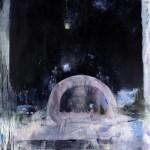
Daughter Not To Disappear
(4AD)
Daughter’s first album, If You Leave, was a supremely melancholy, reverb-heavy album that was almost always quiet but nonetheless utilized dynamic contrasts, growing intense through more subdivided drumbeats and dropping back down with a cymbal crash for a final refrain from vocalist/lyricist Elena Tonra. It did not offer anything that The Cure and Jeff Buckley –even in its own sonic space, less dour than The Cure without the bombast of and vitality of Buckley – but it was nevertheless encompassing in its mood, an album for walks as wintry or dark as the songs.
The band comes off that heaviness a little for Not To Disappear. Guitarist Igor Haefeli plays more hooks with less of an echo, and opener New Ways, which promises more of what If You Leave provided, stands as one of the few songs that could fit onto the older album. The next few songs, however, border on upbeat, providing a counterpoint to Tonra’s lyrics that makes the album almost repellant, as if daring you to enter its world rather than trying to absorb you.
It isn’t quite right to say that Tonra’s vocals and lyrics are the decisive factor of the band. When she croons on the chorus of New Ways, “I’m trying to get out/find a subtle way out/not just cross myself out/not just disappear, the repetition of “out” as a self-rhyme and the obvious metaphor fail to induce an eye roll because it’s rendered convincingly by the texture of the music and her vocal melody. The same is true in Numbers, where kingdom’s become another obvious metaphor. Nonetheless, tracks like Doing the Right Thing, the album’s third, reveal, almost counterintuitively, that Tonra is at her best when she sacrifices attempts at subtlety. The song’s depiction of Alzheimer’s is rendered through images of blaring televisions and empty eyes, but the sense heavy melancholy of the band’s music is a giveaway. The lyrics’ bluntness is more than apparent.
In this sense, Tonra, and by extension Daughter, is best when sentiment is embraced as a weapon rather than avoided as a cliché. On Alone/With You, she bites, “I hate living with you/I should get a dog or something,” a lyric so direct that it might cause a cringe. It recalls the lyrics of songs like Humans, Winter, and Lifeforms, all far more sincere in their sentiment and appeal to emotion than anything else on Not To Disappear.
Alone/With You aside, Fossa is the most straightforward track on the album, and it is no coincidence that it is also among the best. Nevertheless, Daughter seem trapped within the confines of their influences. Something Disintegrationhad in droves, however, was extended, effective metaphors – think of the title track – and, perhaps most importantly, patience. The songs’ introductions would last minutes, with one instrument layering on another upon another, providing a scale and heft that Daughter’s songs lack. As with If You Leave, each song on Not To Disappear is confined by unimaginative structure, and opting for pop songwriting while attempting a more artful sound does not work in this case. Lovesong was not Disintegration’s hit single because it’s a happy song – it isn’t – but because it has a standard pop structure and sentimental lyrics. The stranger the song structurally, the more twisted Smith would allow his metaphors to become. The scope and variety of Not To Disappear’s songs are too narrow for any kind of epiphany to arise from juxtaposition or sequencing, and what’s left is merely a collection of listenable but unremarkable songs.
11 February, 2016 - 04:25 — Forrest Cardamenis